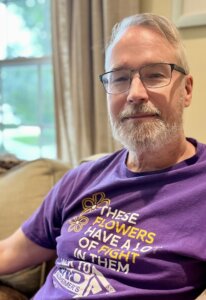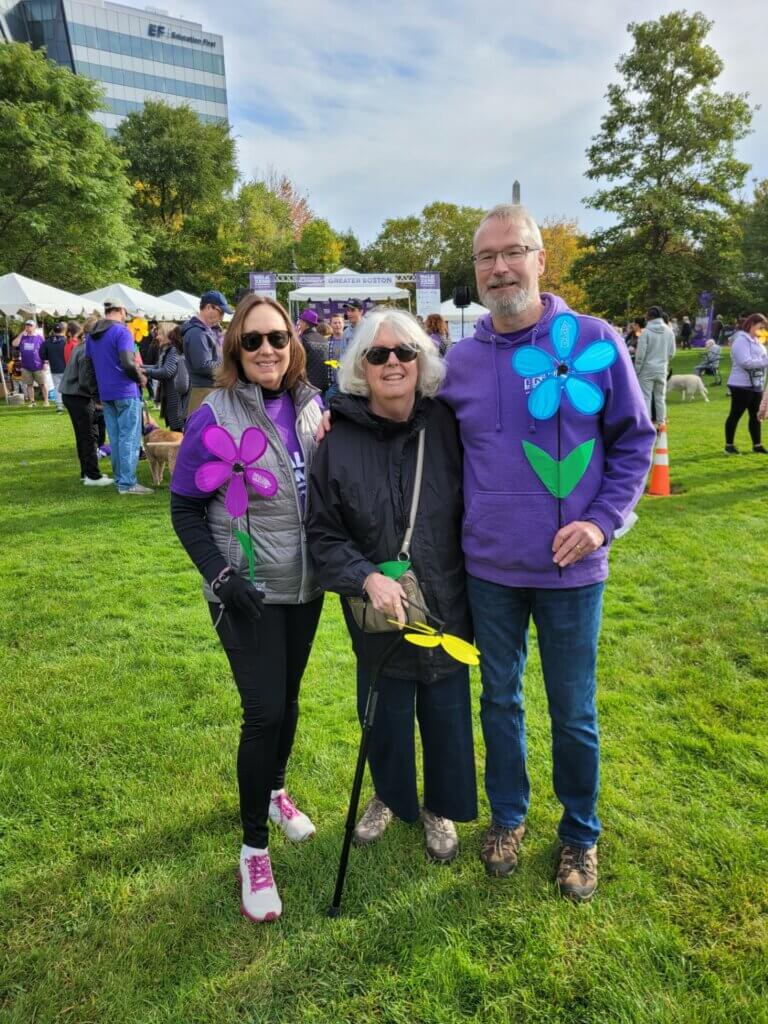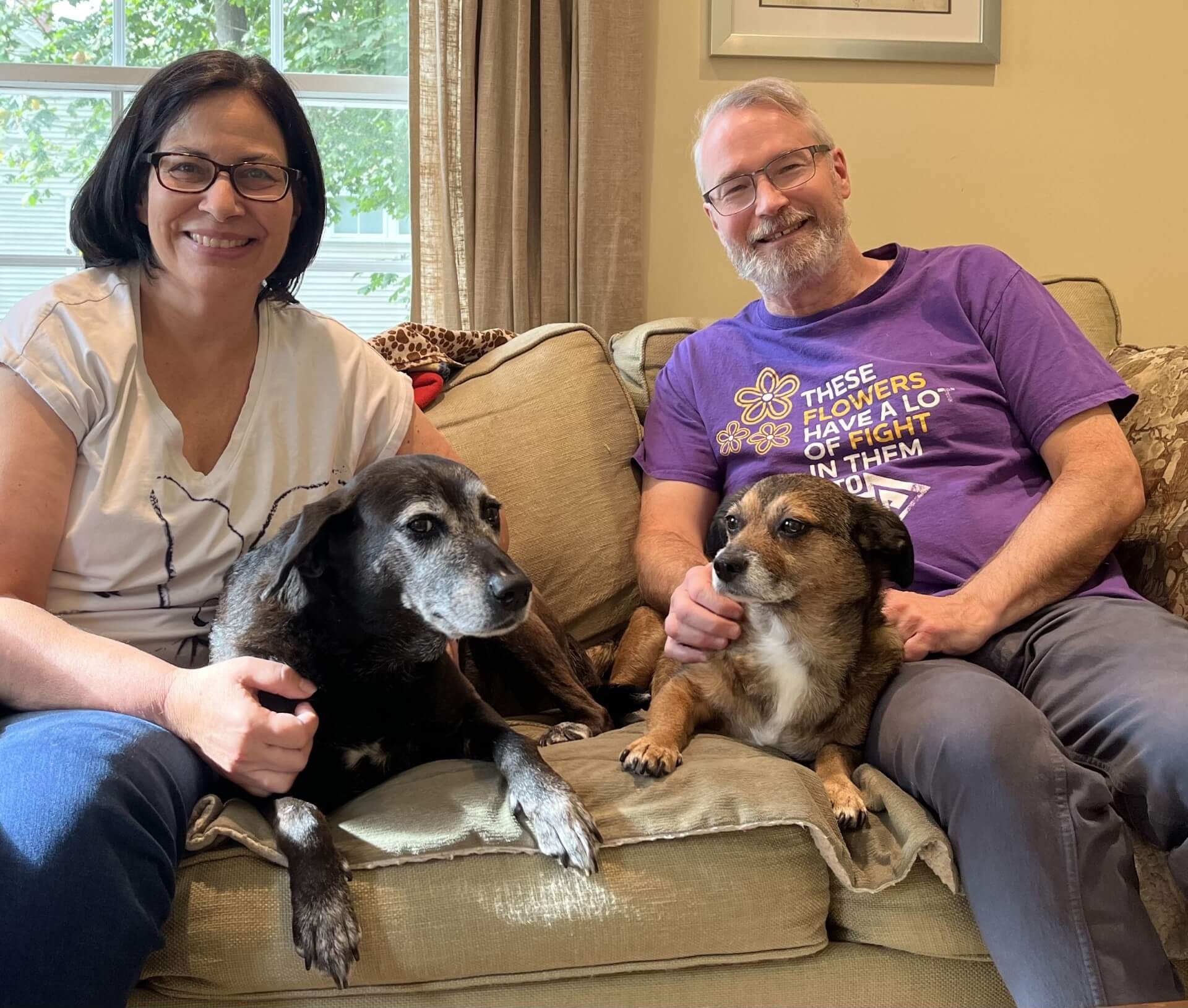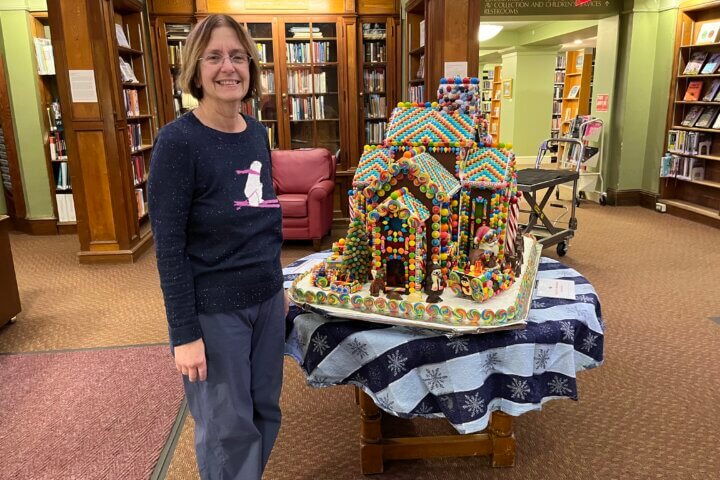
Hugh Courtney’s retirement from the rigors of academia has its good days.
He takes Lady, the family dog, for her joyful daily romp. He works out regularly at the Beede Center (“I get good exercise every day, because it’s good for the brain.”) He and his wife, Pam Loprest, might catch a football game or a comedy show or a play.
But every two weeks, the soft-spoken Courtney gets a two-and-a-half hour infusion of Leqembi — the new drug he and his family hope will slow the progression of his early onset Alzheimer’s Disease.
This past weekend, the couple headed to the Walk to End Alzheimer’s in Cambridge with a group of supporters — including Courtney’s 87-year-old mom — who are cheering him on in his battle and his efforts to spread the word about the insidious condition.
“I think that it’s important to jump in,” he says. “It just feels so sad if I just didn’t do anything.”
About three years ago, Courtney, now 60, started having trouble with his memory and with the lectures he delivered at Northeastern, where he had once served as dean of the D’Amore-McKim School of Business. His doctor suggested he see a neurologist. After exhaustive testing, he got his diagnosis of Alzheimer’s, which runs in his family.
“He still worked as a professor after the diagnosis. That first year was hard,” Loprest says.
“Shouldn’t have done it,” Courtney reflects.
Transitioning to online teaching in the throes of the Covid pandemic didn’t make academic life easier for Courtney, whose specializations included applied game theory and competitive strategy. The university was supportive, the couple says. Loprest helped with getting set up for virtual classes.
But eventually, “it was clear that I needed to get out,” Courtney says quietly as Lady and the family’s other dog, Norman, compete for his attention.
“I can’t remember the details, but the reality was like, ‘Boom, it’s clear.’”

When he decided to retire, Courtney wrote a letter, his wife gently reminds him — one “that was very open and said, ‘I have Alzheimer’s. I can’t do this anymore,’” Loprest says. “People really responded. We had a great outpouring of wonderful notes [about] being so open about it. I think you’ve always been really open to everybody.”
“Well, there’s nothing you can do… There’s no use in hiding away,” Courtney replies. “On the simple level, I just couldn’t do what I used to do.” The change in his brain function wasn’t like flipping a switch, but “it was very evident that things had changed.”
Now, he says, “My life is here with Pam and our kids, which is good.”
As he continued to confront Alzheimer’s, Courtney says he lost touch with some of the people he’d known. “Some people [didn’t] know what to do or didn’t know what to say,” Loprest explains. But family and old friends have rallied to the couple’s cause.
Knowing — and fighting — Alzheimer’s
Alzheimer’s is the most common form of dementia. It is a progressive disease that often starts in the part of the brain associated with learning, and can increasingly affect thinking, memory, mood and behavior. Early onset of the disease is largely considered to come at age 65 or earlier, as it did in Courtney’s case.
According to the CDC, as many as 5.8 million Americans were living with Alzheimer’s in 2020, with that figure expected to triple to almost 14 million by 2060.
While it’s currently incurable, new medications such as lecanemab — marketed as Leqembi — can slow the progression of Alzheimer’s by attacking beta-amyloid proteins that accumulate in the brain.
Courtney takes himself to McLean Hospital in Belmont for his infusions: “I drive fine, because I have my phone, which tells me every turn,” he says, “and so it’s not hard at all, really, to get [there]. And I’ve gotten to know the caregivers.”
The family also knows now what they did not when they started the trial: Courtney received the actual drug, not a placebo. While it is not without dangers, he says he’s largely been free of side effects.
Aside from potential risks such as brain swelling or bleeding, Leqembi has been controversial for its cost: The drug, which received full FDA approval in July, could cost more than $26,000 annually. In Courtney’s case, his family hasn’t had to shoulder that burden because of his participation in the 18-month drug trial.
“Before this, they did have drugs that helped you with symptoms, but they didn’t have anything that really went to treatment,” Loprest says.
While the drug cannot reverse the effects of cognitive decline, slowing its progression “means a little bit more time to do whatever you want to do,” she says. “And that became kind of the rallying cry of the Alzheimer’s Association — ‘More time.’”
The hope of more time
Courtney and Loprest have dedicated much of their lives to each other.
They met as graduate students at MIT. Married 32 years, they have three kids. After the diagnosis, Loprest, an economist, cut back her longtime remote work for a Washington policy institute to four days per week. She no longer travels regularly to D.C.
They two say the Alzheimer’s Association, reachable at alz.org, has been a touchstone. The nonprofit advocacy group “has a 24-hour line [and] you get someone to talk to. They don’t have a recording. They don’t just take your number. They actually talk to you, and they’ve been very, very helpful,” Loprest says.
Courtney is also part of the Association’s Early-Stage Advisory Group, whose members work to raise awareness about Alzheimer’s and advocate for better funding for support and research programs.
For her part, “I think you just have to be positive; have patience,” Loprest says of her role as spouse to someone experiencing cognitive decline. “You can be stressed and then everyone suffers, [or] you can be less stressed and then it can be better for you and for everyone around you. So it’s ‘live in the moment.’”
In this stage of their lives together, the couple is trying to do just that.
This summer, they went on safari to Africa through a travel program for alumni of Northwestern, Courtney’s alma mater. “He used to be our trip planner,” Loprest says of her husband, “so it’s nice to have somebody else do it. And we just enjoyed it.” They’ve also traveled to Amsterdam, where Courtney addressed an international Alzheimer’s conference.
“You don’t know what’ll happen,” Loprest says. “But you can enjoy right now.”




